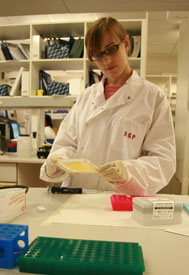Veterinarian uses fellowship to map future course
March / April 2012 | Volume 11, Issue 2

Photo courtesy of Tessa LeCuyer
Fulbright-Fogarty fellow Tessa LeCuyer
used her time in Botswana to develop
her research skills and explore various
career paths.
By Steve Goldstein
Tessa LeCuyer was six years old when she decided that her top goals in life were to ride horses and become a veterinarian. That unwavering certainty about her career served her well until, in the summer before her fourth year at Washington State University's vet school, she had a crisis of indecision: What comes after graduation?
Working in a lab at Stanford University, LeCuyer literally stumbled across the announcement of the inaugural Fulbright-Fogarty Fellowships. "As my apprehension about post-graduate decisions was rising," she recalled, "I opted to investigate this opportunity to give myself a pause in my education." Her fellowship in Botswana would allow her time to consider several career paths.
LeCuyer believes her experience working with veterinary scientists helps her understand the differences and similarities between species and makes her uniquely qualified for a career in public health. Despite the fact that the Botswana-Harvard AIDS Institute Partnership did not involve animal research, LeCuyer said she was aware that "many veterinarians ultimately end up working on projects that affect human health, due in part to available funding but also because of the innate interconnectedness of the physiology of all mammals."
During her fellowship, LeCuyer is helping analyze immunoassays used to assess the recency of HIV infection in cross-sectional surveys, in order to accurately estimate HIV incidence within populations in Botswana. She noted that this data is vital to evaluating interventions but that the cross-sectional surveys tend to be inaccurate, unless population-specific parameters are applied in order to optimize the information.
"My project is to look at these parameters in a population of Botswana citizens so that this method of incidence measurement can be used more meaningfully in Botswana," she explained. Testing has nearly been completed on a cohort of about 400 individuals, so LeCuyer can soon begin analysis of the data. She plans to test an additional study cohort to add to her sample size.
LeCuyer has also found a way to satisfy her "animal instincts." She expects to visit the Botswana National Veterinary Laboratory to discuss a possible project and she plans to travel north to Maun to participate in the sterilization of feral animals, considered a conservation risk in northern Botswana. She's even been able to find a horse to ride, which "allows me to meet a whole new group of people here."
The New Mexico native spent her early years on a Navajo reservation, where her father was a Legal Aid attorney, and views public health as a way of giving back and helping people. Her fellowship has enhanced her self-confidence and encouraged her to advocate for herself, instead of relying on supervisors. She still wavers between becoming a laboratory animal veterinarian or a veterinary scientist, but the Fulbright-Fogarty experience has provided valuable insights.
"A solid understanding of what it means to be able to complete an independent research project, from its implementation through publication, is very important for both of those career paths," said LeCuyer. "The fellowship has given me the time and experience to figure out what comes next."
More Information
To view Adobe PDF files,
download current, free accessible plug-ins from Adobe's website.